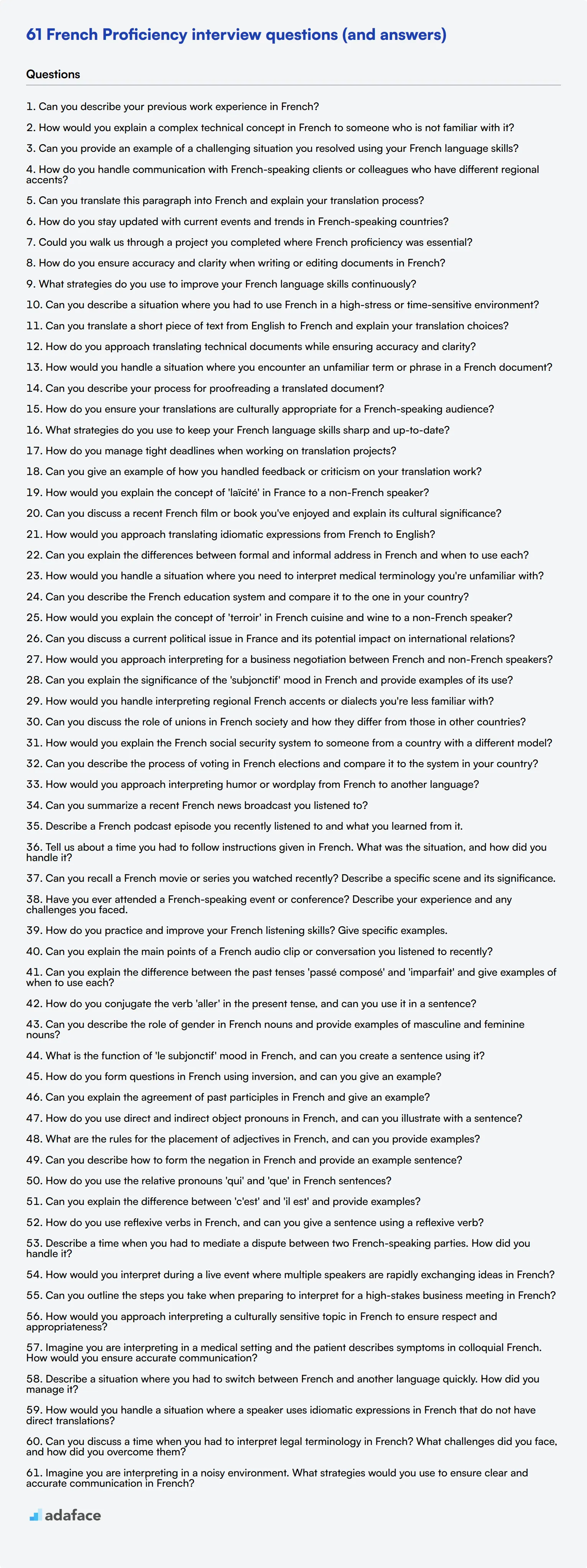Recruiting candidates with strong French proficiency can be challenging, especially when trying to assess key skills within limited interview time. This concise list of French Proficiency interview questions will help hiring managers make informed decisions and avoid potential hiring pitfalls such as miscommunication and poor cultural fit.
In this blog post, we will provide a detailed array of French Proficiency interview questions designed for different roles and proficiency levels. Whether you are hiring for junior translator roles, mid-tier interpreters, or top interpreting positions, you'll find curated questions to streamline your interview process.
Using this list, you can efficiently assess the language skills needed to succeed in your organization. Complement your interviews with our French Proficiency tests to ensure you hire the best talent.
Table of contents
10 common French Proficiency interview questions to ask your candidates
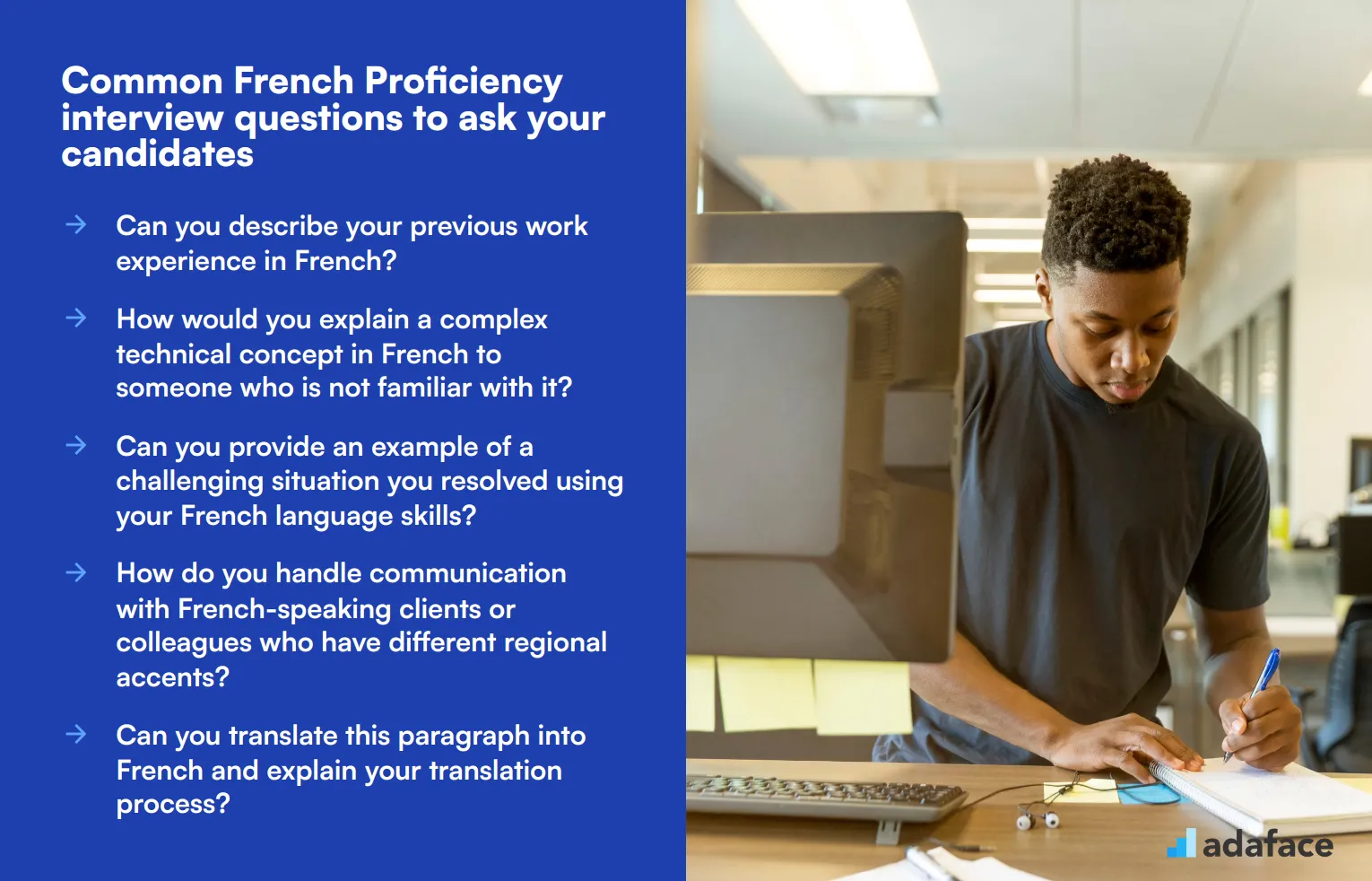
To gauge whether candidates possess the necessary French proficiency for your role, use this list of questions during interviews. These questions will help you assess their language skills in a practical and efficient manner.
- Can you describe your previous work experience in French?
- How would you explain a complex technical concept in French to someone who is not familiar with it?
- Can you provide an example of a challenging situation you resolved using your French language skills?
- How do you handle communication with French-speaking clients or colleagues who have different regional accents?
- Can you translate this paragraph into French and explain your translation process?
- How do you stay updated with current events and trends in French-speaking countries?
- Could you walk us through a project you completed where French proficiency was essential?
- How do you ensure accuracy and clarity when writing or editing documents in French?
- What strategies do you use to improve your French language skills continuously?
- Can you describe a situation where you had to use French in a high-stress or time-sensitive environment?
8 French Proficiency interview questions and answers to evaluate junior translators
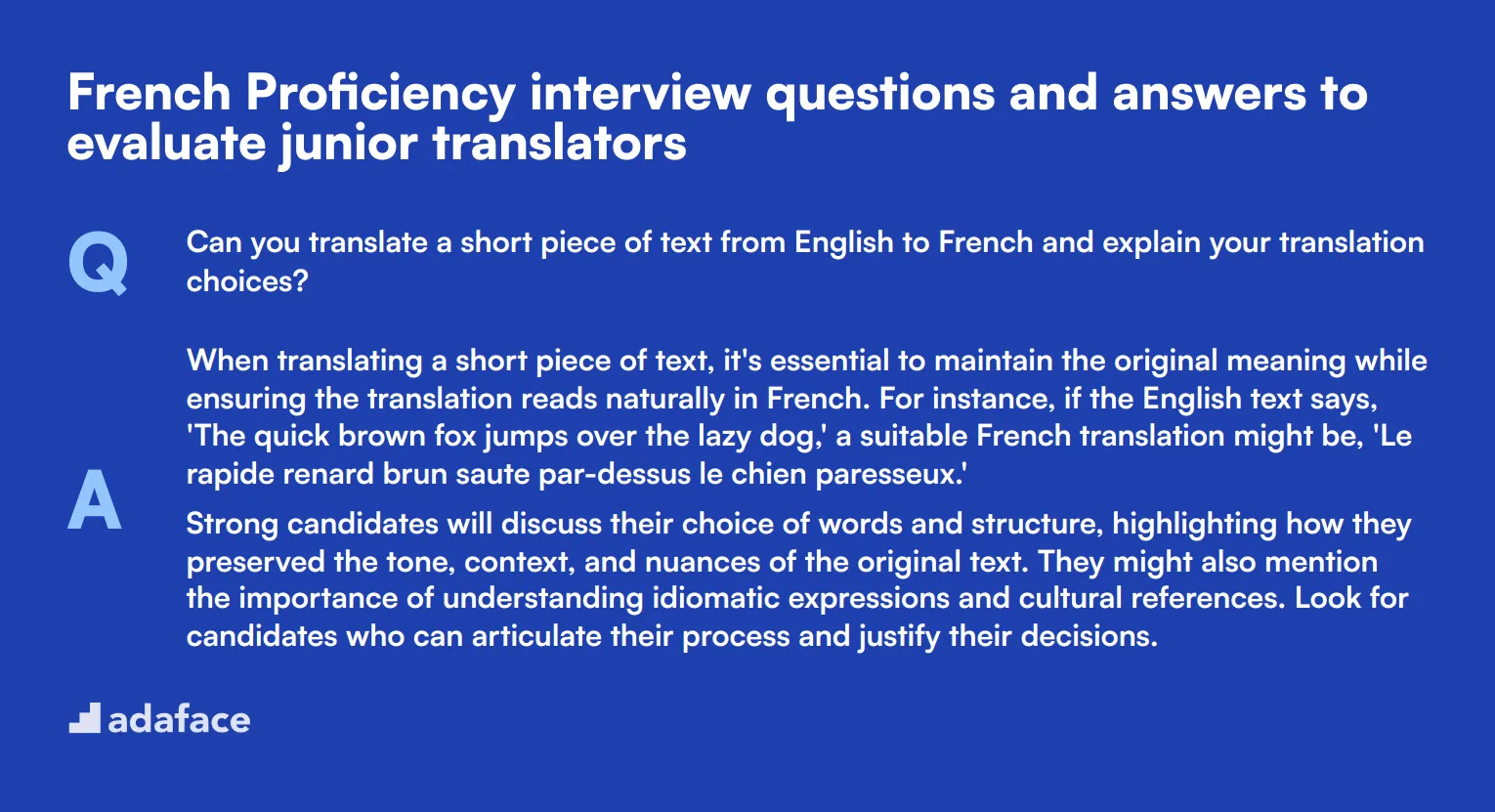
To evaluate the French proficiency of junior translators effectively, asking the right questions is crucial. This list of questions will help you assess their language skills in real-world scenarios, ensuring they can perform their translation tasks accurately and efficiently.
1. Can you translate a short piece of text from English to French and explain your translation choices?
When translating a short piece of text, it's essential to maintain the original meaning while ensuring the translation reads naturally in French. For instance, if the English text says, 'The quick brown fox jumps over the lazy dog,' a suitable French translation might be, 'Le rapide renard brun saute par-dessus le chien paresseux.'
Strong candidates will discuss their choice of words and structure, highlighting how they preserved the tone, context, and nuances of the original text. They might also mention the importance of understanding idiomatic expressions and cultural references. Look for candidates who can articulate their process and justify their decisions.
2. How do you approach translating technical documents while ensuring accuracy and clarity?
Translating technical documents requires a deep understanding of the subject matter and the ability to convey complex information clearly in French. I start by thoroughly reading the document to grasp the main concepts. Then, I translate each section, paying close attention to technical terminology and ensuring consistency throughout the document.
An ideal candidate will emphasize the importance of research and consultation with subject matter experts when necessary. They should also mention the use of glossaries and translation memory tools to maintain accuracy. Look for clear explanations of their methodology and their commitment to delivering precise translations.
3. How would you handle a situation where you encounter an unfamiliar term or phrase in a French document?
When encountering an unfamiliar term, I first try to understand the context in which it is used. If the context doesn't provide enough clues, I consult reliable dictionaries, glossaries, or online resources. If the term is still unclear, I might reach out to colleagues or subject matter experts for clarification.
Candidates should demonstrate resourcefulness and a methodical approach to resolving such issues. They should also highlight their willingness to seek help when needed and their commitment to accuracy. Look for a balance between independent problem-solving and collaboration.
4. Can you describe your process for proofreading a translated document?
Proofreading involves several steps to ensure the translation is error-free and reads naturally. First, I read through the document to check for any grammatical, spelling, or punctuation errors. Then, I compare the translation to the original text to ensure all information is accurately conveyed. Finally, I read the translation aloud to ensure it flows well.
Look for candidates who mention multiple rounds of review and different techniques for identifying errors. An ideal response will demonstrate attention to detail and a commitment to delivering high-quality work.
5. How do you ensure your translations are culturally appropriate for a French-speaking audience?
Ensuring cultural appropriateness involves understanding the cultural context and nuances of the target audience. I consider factors such as idiomatic expressions, humor, and local customs. If needed, I adapt the content to better resonate with the audience while maintaining the original message.
Strong answers will highlight the candidate's awareness of cultural differences and their ability to adapt content accordingly. Look for examples of how they have successfully navigated cultural nuances in their previous work.
6. What strategies do you use to keep your French language skills sharp and up-to-date?
I regularly read French literature, watch French films, and follow French news outlets to stay immersed in the language. Additionally, I participate in language exchange programs and attend workshops or courses to continuously improve my skills.
Candidates should demonstrate a proactive approach to language learning. Look for those who engage with various forms of media and seek out opportunities for practice and improvement. Their commitment to ongoing learning is key.
7. How do you manage tight deadlines when working on translation projects?
Managing tight deadlines requires effective time management and prioritization. I start by breaking down the project into smaller tasks and setting milestones. I also communicate with clients or team members to manage expectations and ensure timely delivery. If needed, I put in extra hours to meet deadlines without compromising quality.
Ideal candidates will show strong organizational skills and the ability to work under pressure. Look for examples of how they have successfully managed deadlines in the past and their strategies for maintaining high-quality work even when time is limited.
8. Can you give an example of how you handled feedback or criticism on your translation work?
Receiving feedback is an essential part of improving my translation skills. I carefully review the feedback to understand the areas that need improvement. For instance, if a client pointed out that my translation was too literal, I would revisit the text and make it more idiomatic. I also keep a record of feedback to track my progress and avoid repeating mistakes.
Look for candidates who demonstrate a positive attitude towards feedback and a willingness to learn from it. Ideal responses will include specific examples of how they have used feedback to enhance their work.
15 intermediate French Proficiency interview questions and answers to ask mid-tier interpreters.
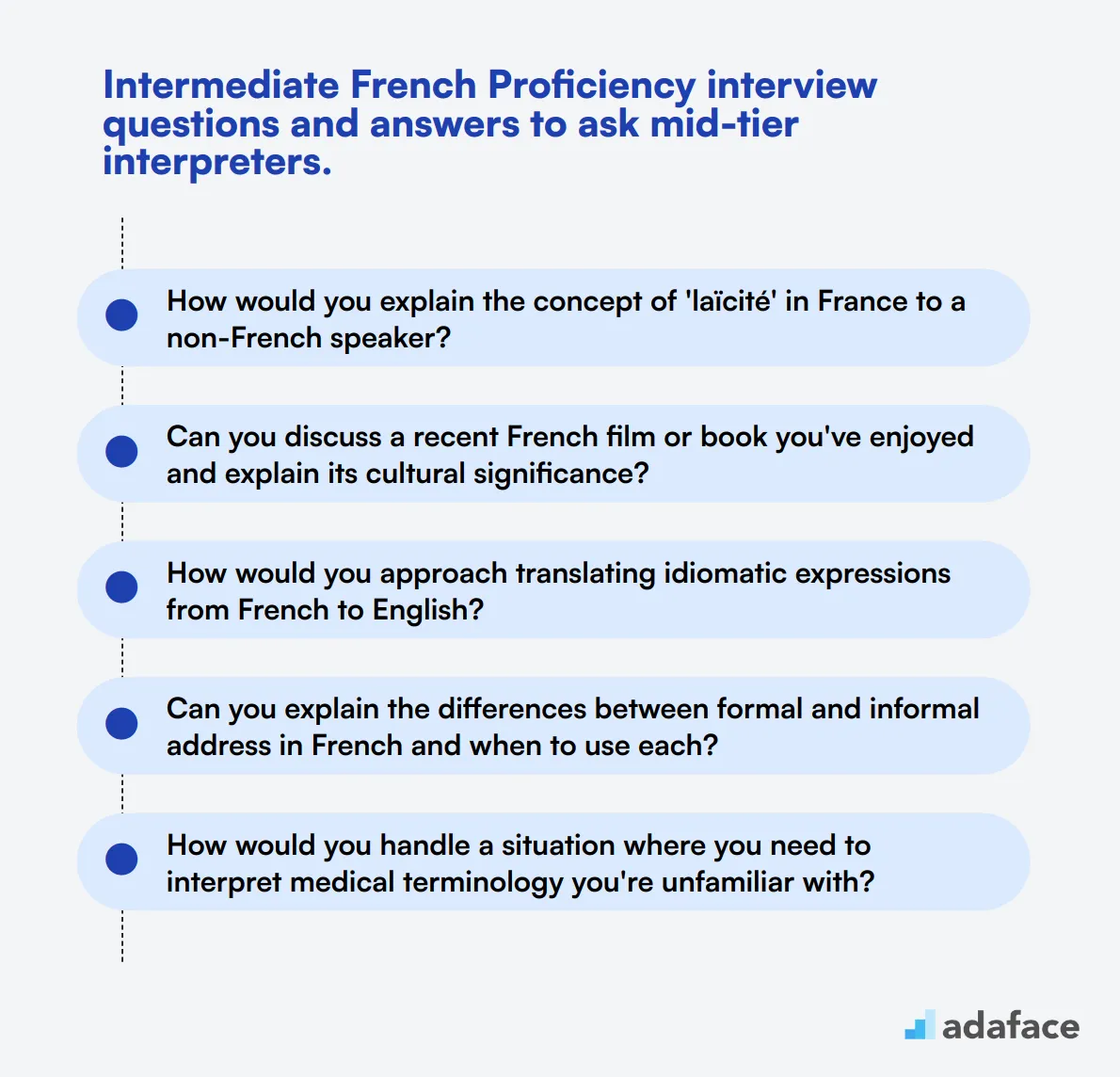
To assess the French proficiency of mid-tier interpreters, use these 15 intermediate interview questions. These questions will help you evaluate candidates' language skills, cultural knowledge, and problem-solving abilities in French-speaking contexts.
- How would you explain the concept of 'laïcité' in France to a non-French speaker?
- Can you discuss a recent French film or book you've enjoyed and explain its cultural significance?
- How would you approach translating idiomatic expressions from French to English?
- Can you explain the differences between formal and informal address in French and when to use each?
- How would you handle a situation where you need to interpret medical terminology you're unfamiliar with?
- Can you describe the French education system and compare it to the one in your country?
- How would you explain the concept of 'terroir' in French cuisine and wine to a non-French speaker?
- Can you discuss a current political issue in France and its potential impact on international relations?
- How would you approach interpreting for a business negotiation between French and non-French speakers?
- Can you explain the significance of the 'subjonctif' mood in French and provide examples of its use?
- How would you handle interpreting regional French accents or dialects you're less familiar with?
- Can you discuss the role of unions in French society and how they differ from those in other countries?
- How would you explain the French social security system to someone from a country with a different model?
- Can you describe the process of voting in French elections and compare it to the system in your country?
- How would you approach interpreting humor or wordplay from French to another language?
7 French Proficiency interview questions and answers related to listening comprehension
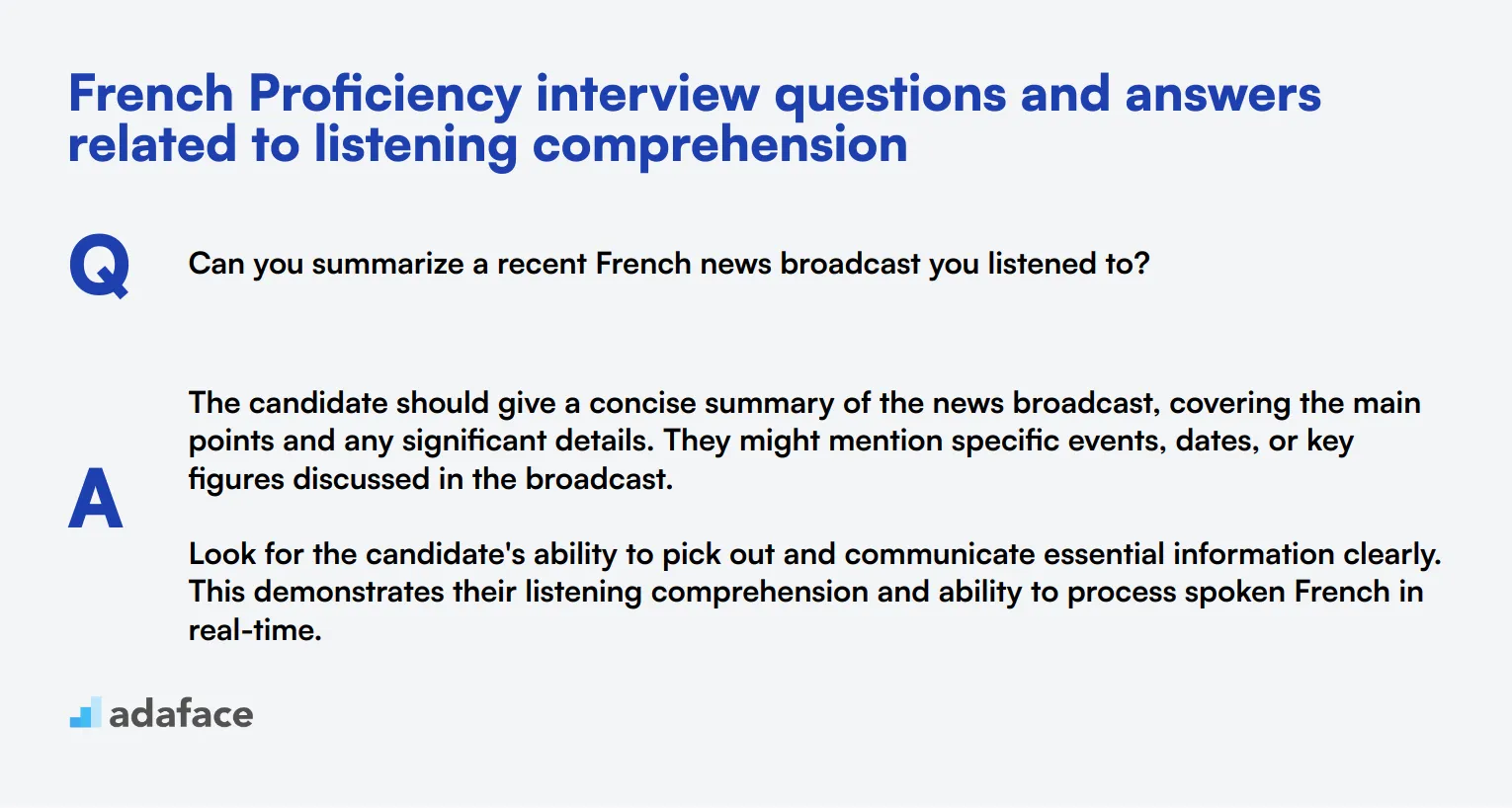
To gauge whether your candidates have mastered French listening comprehension, these questions can be your secret weapon. Use them to assess if candidates can understand spoken French, which is crucial for roles requiring direct communication with French-speaking clients or colleagues.
1. Can you summarize a recent French news broadcast you listened to?
The candidate should give a concise summary of the news broadcast, covering the main points and any significant details. They might mention specific events, dates, or key figures discussed in the broadcast.
Look for the candidate's ability to pick out and communicate essential information clearly. This demonstrates their listening comprehension and ability to process spoken French in real-time.
2. Describe a French podcast episode you recently listened to and what you learned from it.
The candidate should describe the podcast's topic, main points, and any interesting facts or insights they gained from it. They should be able to convey the episode's essence in a structured and clear manner.
An ideal response will show the candidate's ability to follow and understand complex spoken content in French, as well as summarize it effectively.
3. Tell us about a time you had to follow instructions given in French. What was the situation, and how did you handle it?
The candidate should describe a specific situation where they received instructions in French, such as a work assignment, travel directions, or a procedural task. They should explain how they understood and executed the instructions.
This will help you assess their ability to comprehend and act on spoken French in practical situations, demonstrating both listening skills and practical application.
4. Can you recall a French movie or series you watched recently? Describe a specific scene and its significance.
The candidate should describe a specific scene from the movie or series, including the characters involved, the dialogue, and the scene's significance to the overall plot.
This question gauges the candidate's ability to understand and interpret spoken French in a cultural context, reflecting their depth of comprehension and cultural literacy.
5. Have you ever attended a French-speaking event or conference? Describe your experience and any challenges you faced.
The candidate should share their experience of attending a French-speaking event, detailing the type of event, key speakers or topics, and their overall understanding of the discussions.
Look for their ability to navigate and comprehend spoken French in a professional or social setting, indicating their listening proficiency and adaptability.
6. How do you practice and improve your French listening skills? Give specific examples.
The candidate should mention specific strategies they use to enhance their listening skills, such as listening to French music, watching French films, or using language learning apps. They might also discuss any routine practices like listening to French radio or podcasts.
Effective responses will showcase proactive and consistent efforts to improve listening comprehension, reflecting the candidate's dedication to maintaining and advancing their language skills.
7. Can you explain the main points of a French audio clip or conversation you listened to recently?
The candidate should summarize the audio clip or conversation, highlighting the main points and any notable details. They should convey the essence of the spoken content accurately.
This question tests their ability to extract and communicate key information from spoken French, crucial for roles involving extensive listening and comprehension.
12 French Proficiency questions related to grammar and syntax
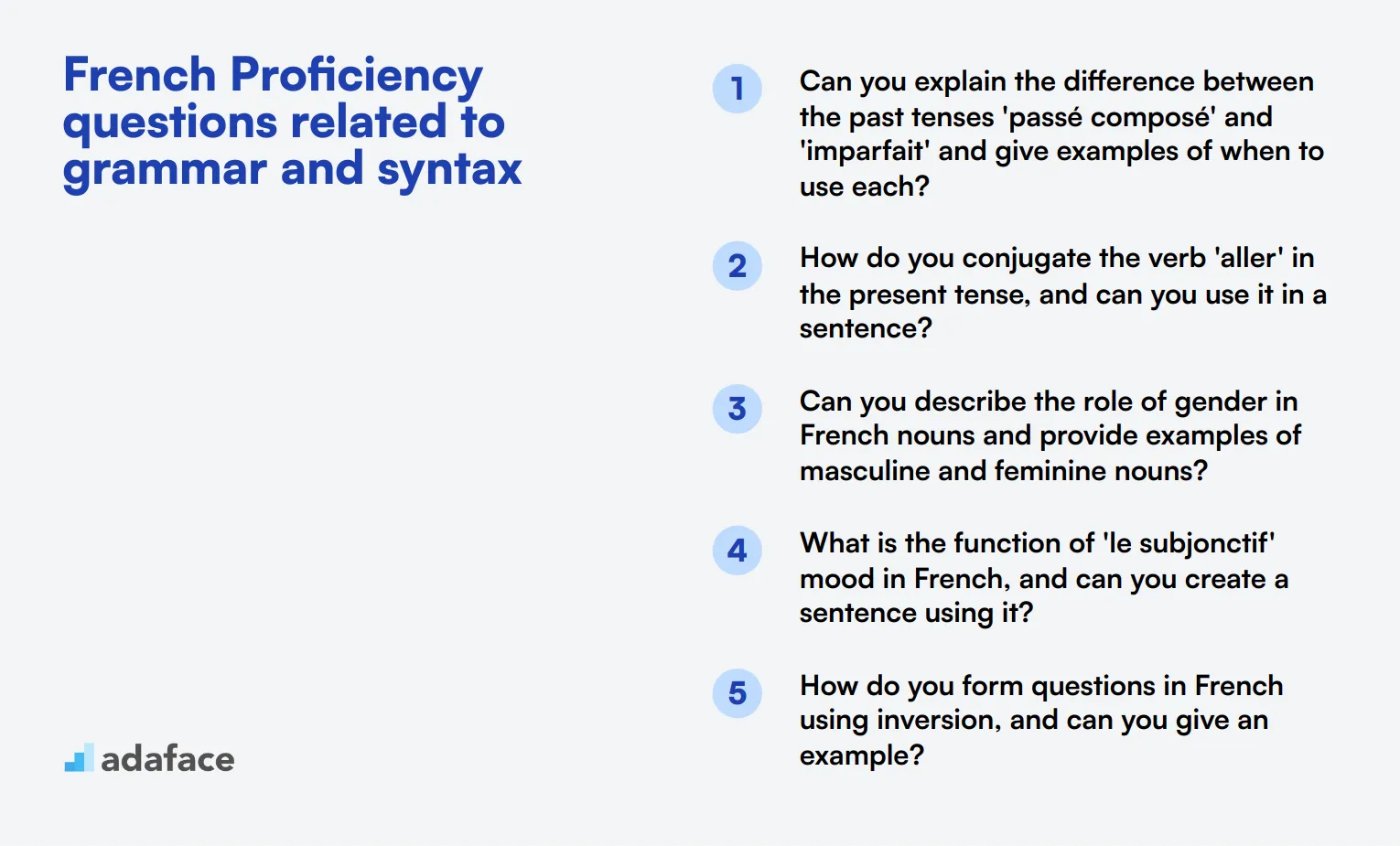
To determine whether your applicants have the right skills to effectively communicate in French, consider using some of these 12 French proficiency interview questions related to grammar and syntax. These questions are designed to assess your candidates' understanding of French language structure, ensuring they can meet the demands of roles that require fluency in French, such as content-writer.
- Can you explain the difference between the past tenses 'passé composé' and 'imparfait' and give examples of when to use each?
- How do you conjugate the verb 'aller' in the present tense, and can you use it in a sentence?
- Can you describe the role of gender in French nouns and provide examples of masculine and feminine nouns?
- What is the function of 'le subjonctif' mood in French, and can you create a sentence using it?
- How do you form questions in French using inversion, and can you give an example?
- Can you explain the agreement of past participles in French and give an example?
- How do you use direct and indirect object pronouns in French, and can you illustrate with a sentence?
- What are the rules for the placement of adjectives in French, and can you provide examples?
- Can you describe how to form the negation in French and provide an example sentence?
- How do you use the relative pronouns 'qui' and 'que' in French sentences?
- Can you explain the difference between 'c'est' and 'il est' and provide examples?
- How do you use reflexive verbs in French, and can you give a sentence using a reflexive verb?
9 situational French Proficiency interview questions for hiring top interpreters
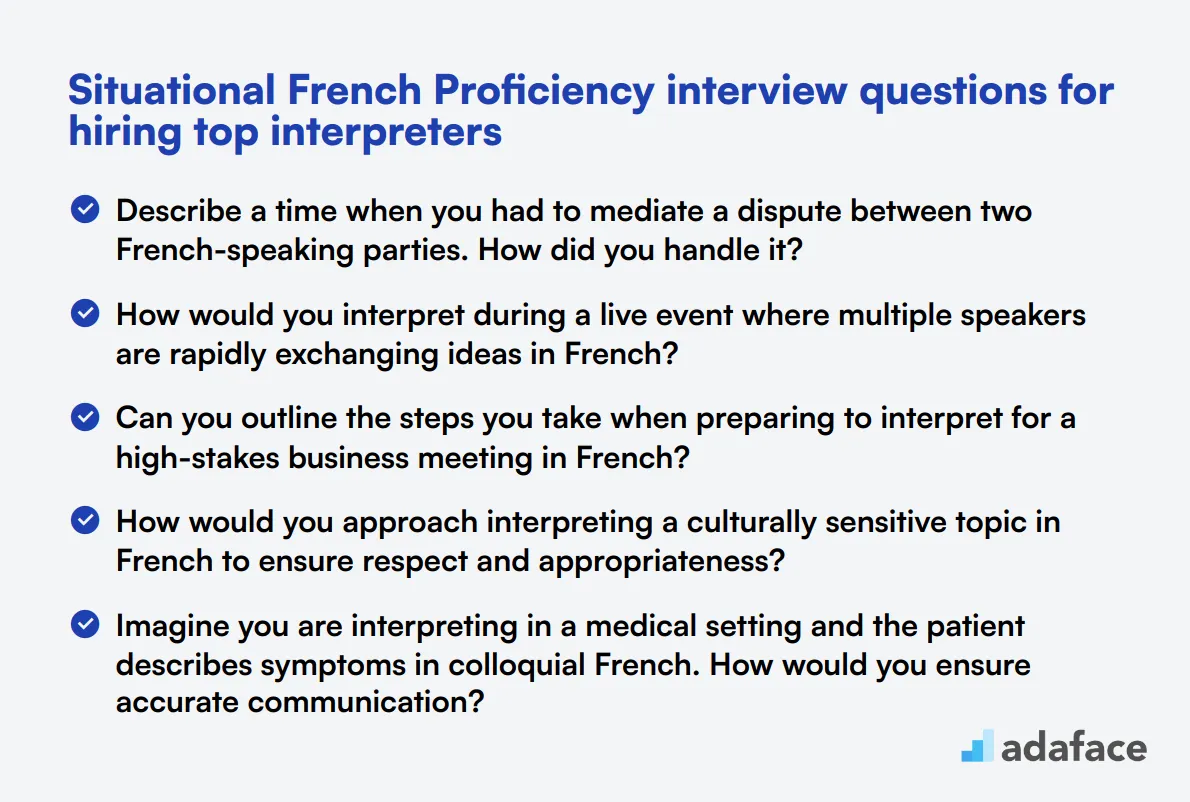
To ensure your candidates can handle real-world scenarios with their French proficiency, use these situational interview questions. They will help you gauge how well applicants can navigate complex situations, ensuring you hire top interpreters for your team.
- Describe a time when you had to mediate a dispute between two French-speaking parties. How did you handle it?
- How would you interpret during a live event where multiple speakers are rapidly exchanging ideas in French?
- Can you outline the steps you take when preparing to interpret for a high-stakes business meeting in French?
- How would you approach interpreting a culturally sensitive topic in French to ensure respect and appropriateness?
- Imagine you are interpreting in a medical setting and the patient describes symptoms in colloquial French. How would you ensure accurate communication?
- Describe a situation where you had to switch between French and another language quickly. How did you manage it?
- How would you handle a situation where a speaker uses idiomatic expressions in French that do not have direct translations?
- Can you discuss a time when you had to interpret legal terminology in French? What challenges did you face, and how did you overcome them?
- Imagine you are interpreting in a noisy environment. What strategies would you use to ensure clear and accurate communication in French?
Which French Proficiency skills should you evaluate during the interview phase?
While it's impossible to assess every aspect of a candidate's French proficiency in one interview, there are core skills that should be evaluated. These skills form the foundation for effective communication and interpretation in French, ensuring that the candidate is well-equipped for the role.
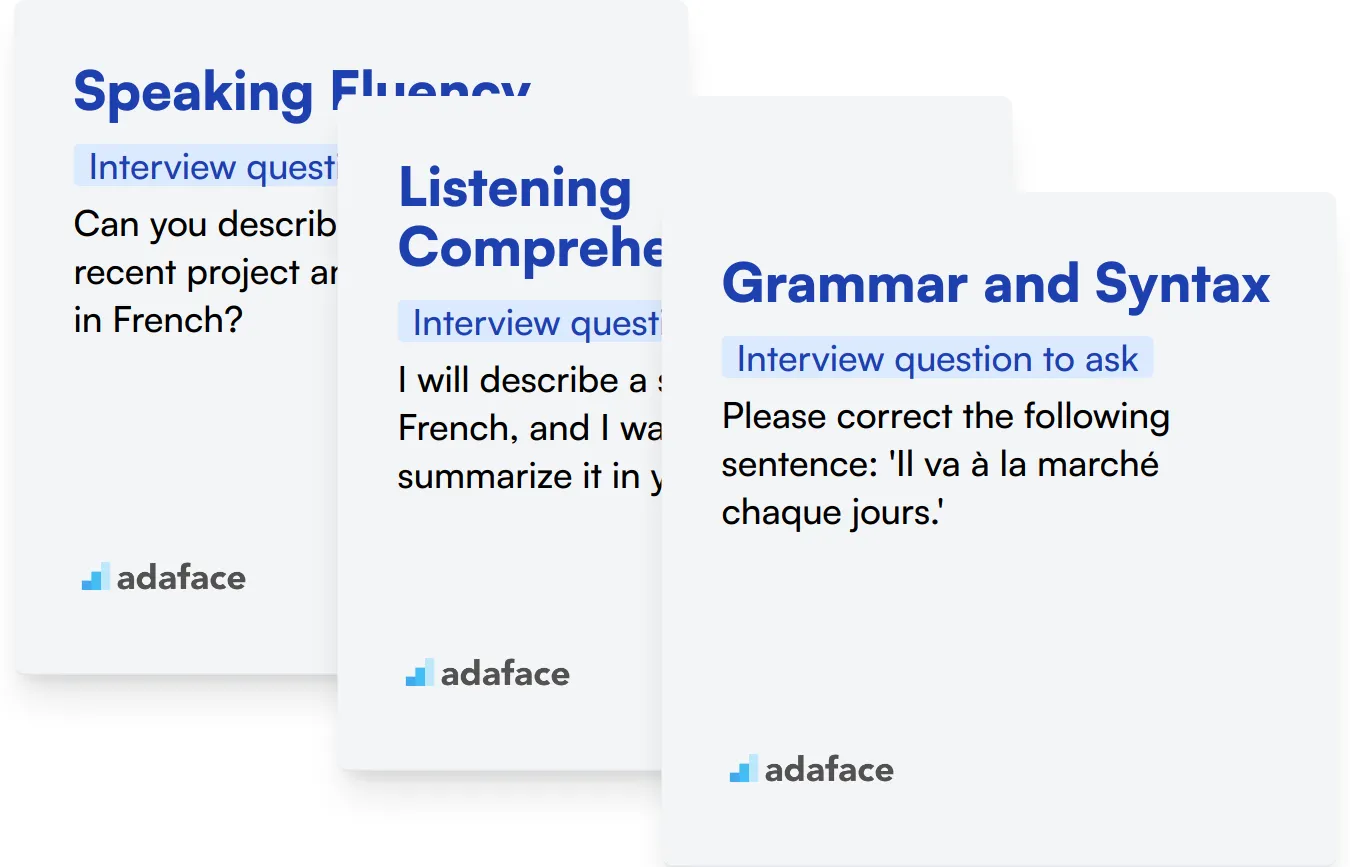
Speaking Fluency
You can use an assessment test that asks relevant MCQs to filter out this skill. For instance, our French proficiency test includes questions specifically designed to evaluate speaking fluency.
During the interview, you can also ask targeted questions to judge speaking fluency. These questions help you understand how well the candidate can articulate and respond in French.
Can you describe your most recent project and your role in it, in French?
Look for clarity of speech, appropriate use of vocabulary, and the ability to form coherent and grammatically correct sentences. The candidate's confidence and spontaneity in speaking are also important indicators.
Listening Comprehension
An assessment test with relevant MCQs can help filter out listening comprehension skills. For example, our French proficiency test includes listening comprehension components to evaluate this skill.
You can ask questions that require the candidate to listen and respond to spoken French. This helps gauge their ability to understand and process auditory information.
I will describe a scenario in French, and I want you to summarize it in your own words.
Pay attention to how accurately the candidate captures the details and essence of the scenario. Look for comprehension of key points and the ability to provide a concise and accurate summary.
Grammar and Syntax
Utilizing an assessment test with relevant MCQs can help evaluate grammar and syntax knowledge. Our French proficiency test includes sections specifically designed to assess these skills.
To assess grammar and syntax during an interview, ask candidates to construct sentences or correct grammatical errors. This helps you gauge their understanding and application of grammatical rules.
Please correct the following sentence: 'Il va à la marché chaque jours.'
Observe the candidate's ability to identify and correct grammatical errors. Assess their knowledge of proper article usage, verb conjugation, and singular/plural forms.
3 tips for using French Proficiency interview questions
Here are our tips before you start putting what you've learned to use.
1. Utilize skills tests before the interview
Using skills tests before the interview process can help you filter out candidates who may not meet your proficiency requirements, saving both time and resources.
Consider using tests such as the French Proficiency Test or the French Intermediate B1 Test from our test library.
Administering these tests early in the hiring process ensures that you are only interviewing candidates who meet the necessary proficiency standards, making subsequent interviews more focused and productive.
2. Compile and tailor your interview questions
It's important to select a manageable number of relevant questions for your interview to maximize the effectiveness of your evaluation.
Consider integrating questions that evaluate not only French proficiency but also related skills such as communication and cultural fit.
This ensures a holistic assessment of the candidate, covering various aspects that matter for the role.
3. Ask follow-up questions
Just using predefined interview questions may not be enough to gauge a candidate's true proficiency.
Follow-up questions help you understand the depth of a candidate's knowledge and whether they can apply their skills practically. For example, if a candidate is asked to describe their experience with translating technical documents, a good follow-up question could be, 'Can you provide a specific example where you faced a challenge and how you overcame it?' This will give you insight into their problem-solving abilities and depth of experience.
Streamline Your French Proficiency Hiring Process with Skills Tests
When hiring for French proficiency, it's important to accurately assess candidates' skills. The most effective way to do this is by using a French Proficiency Test. This test helps you quickly identify top candidates based on their actual language abilities.
After using the test to shortlist the best applicants, you can invite them for interviews. To get started with improving your hiring process, sign up for Adaface's online assessment platform. You'll gain access to a wide range of language tests and other assessment tools to help you make informed hiring decisions.
Pre-employment French Proficiency Test
Download French Proficiency interview questions template in multiple formats
French Proficiency Interview Questions FAQs
Include questions on translation, interpretation, listening comprehension, grammar, and situational scenarios.
Combine interview questions with practical tests that evaluate translation, interpretation, and listening skills.
Situational questions reveal how candidates apply their skills in real-world scenarios and handle language-related challenges.
Yes, customize questions to match the responsibilities and skill level required for the specific position.
They assess a candidate’s understanding and usage of French language structure, which is crucial for accurate communication.
Look for clarity, accuracy, and the ability to provide contextually relevant translations and interpretations.

40 min skill tests.
No trick questions.
Accurate shortlisting.
We make it easy for you to find the best candidates in your pipeline with a 40 min skills test.
Try for freeRelated posts
Free resources




